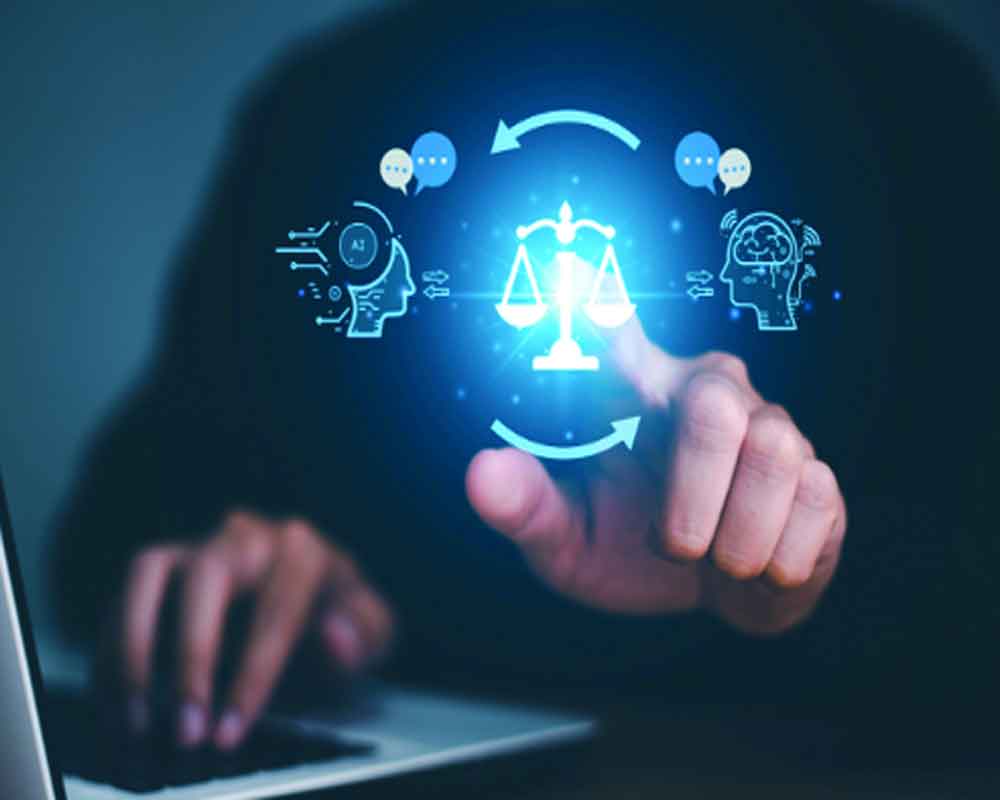In a world increasingly shaped by Artificial Intelligence, the discourse shifts from its capabilities to the imperative question of its ethical boundaries
In an era increasingly defined by Artificial Intelligence (AI), the pivotal question shifts from what AI is capable of to what it should be allowed to do. This reflection critically examines AI’s potential to reshape our lives within ethical and legal frameworks. As we explore the vast landscapes carved by AI, we must ensure that our technological advancements are matched with an equally profound commitment to ethical responsibility.
The advent of AI is a testament to human ingenuity, offering transformative possibilities in virtually every aspect of our existence. Yet, alongside its potential, AI introduces a spectrum of legal complexities that require careful consideration. The evolution of legal jurisprudence in the face of AI’s rapid development is a topic of paramount importance, dealing with issues ranging from privacy and data protection to intellectual property and employment.
The Indian Government’s embrace of AI through initiatives like “Digital India” and a National Strategy for Artificial Intelligence reflects a visionary stance on harnessing technology for societal benefit. However, the journey toward realising AI’s full promise is fraught with challenges that demand vigilant oversight and a principled approach to regulation and ethics.
On a global scale, AI raises questions that transcend national boundaries, presenting legal and ethical dilemmas that must be addressed comprehensively. The capacity of AI to analyse and utilise vast amounts of personal data has challenged existing privacy laws, sparking a worldwide reassessment of how we protect individual rights in the digital age. Countries are adopting comprehensive data protection regulations, such as the European Union’s General Data Protection Regulation and India’s Digital Personal Data Protection Act 2023, to safeguard personal information while fostering digital innovation.
The implications of AI on the job market also warrant serious consideration. The potential for automation to displace jobs creates a pressing need for legal frameworks that can mitigate adverse effects and prepare the workforce for an AI-driven future. Similarly, the intersection of AI with intellectual property rights challenges conventional notions of creativity and authorship, calling for legal innovations that recognise and protect the contributions of all stakeholders, including those of AI.
The issues of bias and discrimination in AI highlight the critical need for our technological systems to be as impartial and inclusive as possible. The development and deployment of AI must be guided by anti-discrimination laws adapted to the digital age, ensuring fairness and equity in the application of AI. Internationally, the regulatory approach to AI varies significantly, with entities like the European Union adopting comprehensive frameworks while others pursue more sector-specific guidelines.
This diversity reflects the complex interplay of legal, cultural, and societal factors that influence AI governance, emphasising the need for a globally coordinated dialogue on AI ethics and regulation.
Integrating AI into the legal profession offers a glimpse into the future, showcasing AI’s potential to enhance legal analysis, predict outcomes, and even assist in judicial decision-making. However, these advancements underscore the imperative for stringent ethical standards to uphold the integrity of the legal system. As AI continues to evolve rapidly, it becomes crucial for societies, especially within the diverse context of India, to engage in proactive discourse. We must anticipate future developments and craft legal frameworks that are flexible enough to adapt to the unpredictable technological landscape. This includes ensuring that the benefits of AI extend to all and democratising access to services like healthcare and education.
In conclusion, as we chart the course of AI within the legal domain, our focus must steadfastly remain on enacting and refining laws that protect human rights and dignity. Achieving harmony between emerging technology and legal norms requires a culture of continuous learning and adaptation, where laws are designed not just to respond to the challenges posed by AI but to foresee and embrace its vast possibilities.
With India at the forefront of AI innovation, buoyed by progressive policies and a wealth of intellectual capital, we stand on the brink of leading the global conversation on ethical AI. As we venture deeper into this new frontier, our collective aim should be a future where technology amplifies the noblest goals of law and justice, and in return, legal frameworks foster the responsible growth of Artificial Intelligence.
(The author is a legal expert. Views expressed are personal)


























